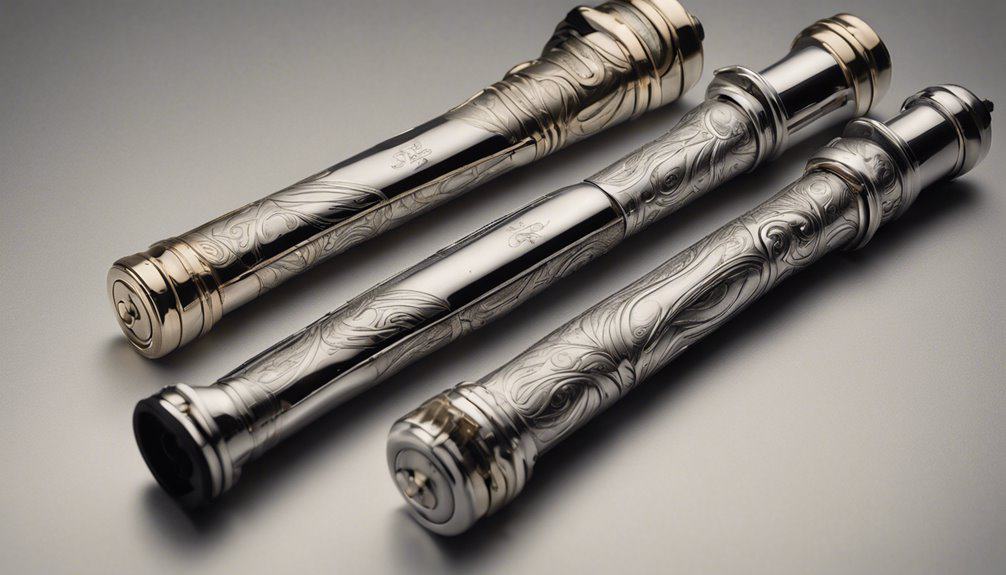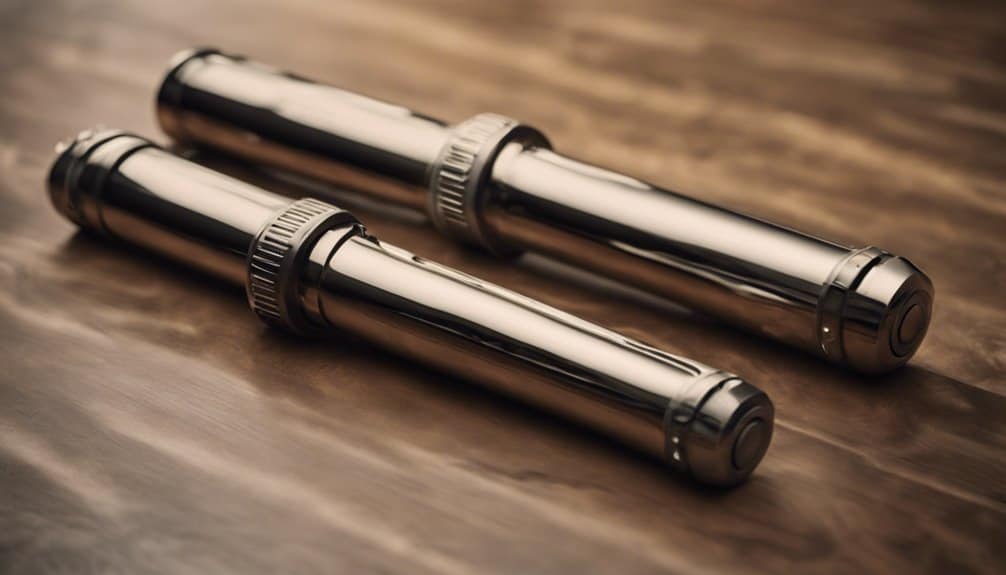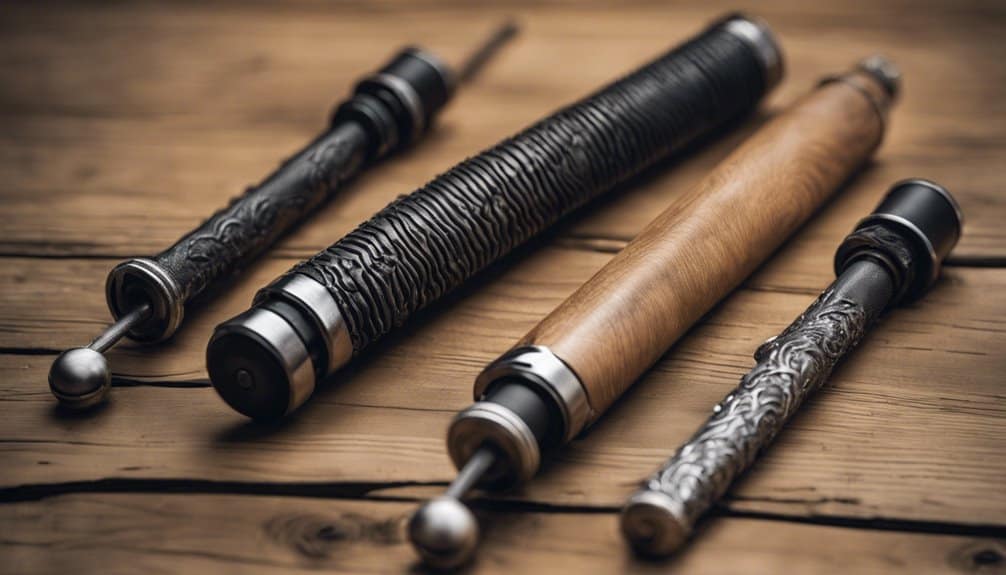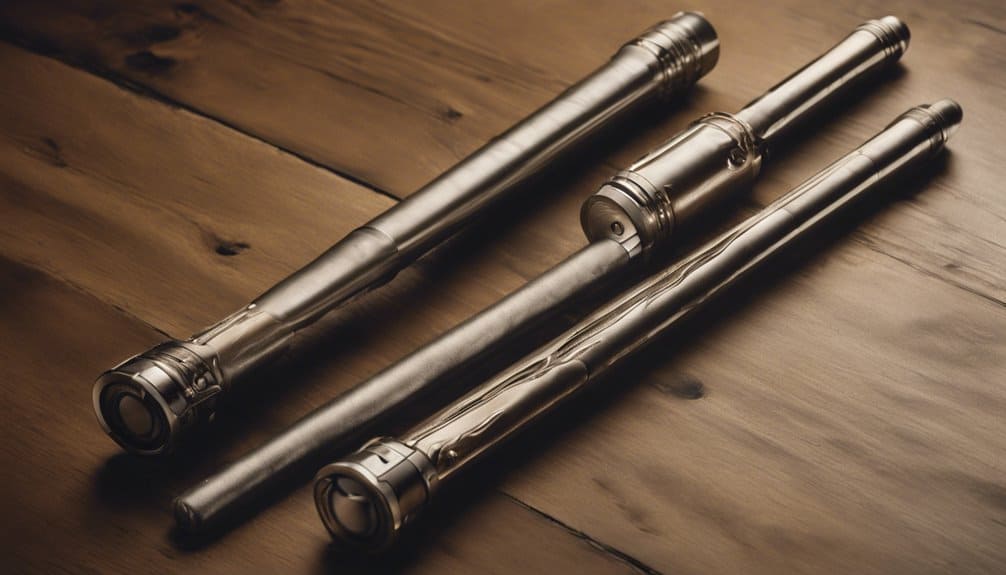Friction Lock vs. Button Lock: Which Telescopic Baton Is Better?
When it comes to the friction lock versus button lock batons, you’re in for a showdown! Friction lock batons are sturdy and reliable but need a solid surface to close them—think of them as the muscle-bound friends who always want to lift heavy weights. On the flip side, button locks are like your chill buddy who opens things up quietly with just a push; they offer smooth operation and convenience. Both have their perks, but button locks are often favored for quick escapes in sticky situations. Whichever you choose, there’s more to discuss before you make that final decision!
 When you’re checking out friction lock batons, you’ll notice their unique locking mechanism, which relies on some serious friction magic. You’ll love how they handle, too, especially when you realize they need a good smack against something solid to close—like that time you accidentally dropped your phone on the pavement (yikes!). Plus, these batons come with various grip options, so whether you prefer something grippy or a bit softer, there’s probably a style that’ll make you say, “This is just right!”
When you’re checking out friction lock batons, you’ll notice their unique locking mechanism, which relies on some serious friction magic. You’ll love how they handle, too, especially when you realize they need a good smack against something solid to close—like that time you accidentally dropped your phone on the pavement (yikes!). Plus, these batons come with various grip options, so whether you prefer something grippy or a bit softer, there’s probably a style that’ll make you say, “This is just right!”
With finishes like black chrome-plated steel and electroless nickel-plated steel, you can choose a look that suits your style. It’s like picking out a new outfit, but for your baton! So, when you think about button lock batons, you’re not just getting a tool—you’re getting a well-crafted companion ready for action. In addition, you may want to consider the expandable lengths of 16, 21, or 26 inches available in other baton options for versatility.
 When it comes to choosing your baton, handling preferences play a huge role; you probably want something that feels just right in your hand. Some folks have shared wild stories about how their baton’s performance saved the day, while others have grumbled about weight and balance issues that made them feel like they were swinging a brick. So, let’s chat about what you’ve experienced – does your baton make you feel like a superhero or just a confused sidekick?
When it comes to choosing your baton, handling preferences play a huge role; you probably want something that feels just right in your hand. Some folks have shared wild stories about how their baton’s performance saved the day, while others have grumbled about weight and balance issues that made them feel like they were swinging a brick. So, let’s chat about what you’ve experienced – does your baton make you feel like a superhero or just a confused sidekick?
Many folks find the Peacekeeper baton to be a top choice, especially when reports show ASP cuffs causing injuries to officers. Ouch! Plus, the Leverloc batons score big points for being easy to close without needing a hard surface, while the Monadnock batons? Not so much, as they’re often described as heavy and unwieldy.
You might notice that the weight and balance of these batons can really affect your confidence during altercations. If you’re lugging around something that feels like a brick, you’re probably not going to feel very agile. So, when it comes to batons, user experiences definitely help steer the conversation!
 Online forums buzz with insights from baton enthusiasts enthusiastic to share their experiences with friction lock and button lock telescopic batons. You’ll find spirited debates and passionate opinions, especially regarding the popular Peacekeeper batons that often outshine ASP models. With over 5,689 users chiming in, it’s clear this community loves discussing baton functionality and design.
Here’s a quick look at what folks are saying:
Online forums buzz with insights from baton enthusiasts enthusiastic to share their experiences with friction lock and button lock telescopic batons. You’ll find spirited debates and passionate opinions, especially regarding the popular Peacekeeper batons that often outshine ASP models. With over 5,689 users chiming in, it’s clear this community loves discussing baton functionality and design.
Here’s a quick look at what folks are saying:
Many users emphasize the importance of balance and weight, preferring lighter models for better maneuverability. And let’s face it, carrying a baton that feels like a brick isn’t fun! So, if you’re on the fence about which to choose, check out these discussions. You might just find your next favorite friction baton from a fellow enthusiast’s glowing review! Happy baton hunting!
 When it comes to selecting the right baton, understanding the differences between friction lock and button lock models is essential. You’ve got two solid choices here, and they each have their perks. Friction lock batons, like the ASP F Series, need a hard surface to close. So, if you’re in a pinch, that could be a hassle! On the flip side, button lock batons, such as the Talon Infinity, let you close it up without banging it against anything. Super convenient, right?
Now, let’s talk lengths. Friction lock batons come in 16, 21, or 26 inches, while Talon batons range from 40 to 60 centimeters. Pick what suits your style! When it comes to grips, friction lock gives you options like foamed vinyl, whereas Talon offers aggressive vector grips for better control.
Don’t forget about activation systems! Friction locks require some action, while button locks are all about that quiet push-button magic. And hey, always consider your comfort and agency needs—after all, you want a baton that feels just right. Happy baton hunting!
When it comes to selecting the right baton, understanding the differences between friction lock and button lock models is essential. You’ve got two solid choices here, and they each have their perks. Friction lock batons, like the ASP F Series, need a hard surface to close. So, if you’re in a pinch, that could be a hassle! On the flip side, button lock batons, such as the Talon Infinity, let you close it up without banging it against anything. Super convenient, right?
Now, let’s talk lengths. Friction lock batons come in 16, 21, or 26 inches, while Talon batons range from 40 to 60 centimeters. Pick what suits your style! When it comes to grips, friction lock gives you options like foamed vinyl, whereas Talon offers aggressive vector grips for better control.
Don’t forget about activation systems! Friction locks require some action, while button locks are all about that quiet push-button magic. And hey, always consider your comfort and agency needs—after all, you want a baton that feels just right. Happy baton hunting!
Baton Overview
A telescopic baton is an essential tool in law enforcement, designed for precision and effectiveness in various situations. Picture yourself in a high-pressure scenario, and you need something reliable. That’s where the baton comes in! These impact weapons, often made from tough materials like 4140 steel and 7075 T6 aluminum, are built to last and resist corrosion. So, if you’re sweating in the rain or facing a tough crowd, your baton won’t let you down. What’s great about expandable batons is their versatility. You can easily carry an ultra-compact model when you’re off duty, or opt for a full-sized one that uniformed officers prefer. Each baton features a hard striking surface and a secure grip, which means you can handle it confidently. Plus, they deploy quickly—just a flick of the wrist, and you’re ready for action! Additionally, the friction lock system allows for rapid extension and retraction, making it a practical choice for self-defense situations.Understanding Baton Mechanisms
When you’re choosing a telescopic baton, understanding the mechanisms that make them work can really set you up for success. So, let’s explore the nitty-gritty! Friction lock batons are a popular choice, operating through dynamic maneuvers that rely on tapers and friction to stay secure. You’ll need a solid surface to close them properly, which can be a bit tricky if you’re not careful. Imagine trying to close your baton on a soft pillow—yeah, that won’t work! On the flip side, you have button lock batons, like the Talon Infinity. These beauties let you open them quietly with a simple push of a button, making them super handy for discreet situations. No need to bang them on the ground like a caveman! When it comes to lengths, friction lock batons come in 16, 21, or 26 inches, while Talon batons stretch up to 60 centimeters. And don’t forget about grip—friction lock batons offer options like foamed vinyl for comfort and aggressive textures for control. So, think about your needs, environment, and personal style before making that choice!Friction Lock Specifications

Locking Mechanism Design
In the world of telescopic batons, friction lock mechanisms stand out for their unique design and operational demands. When you envision a friction lock baton, like the ASP F Series, consider this: it opens with some dynamic maneuvers and locks in place using a clever taper and friction design. But here’s the catch—you need to give it a good whack against a hard surface to close it. Talk about needing a bit of muscle! Friction lock batons come in handy lengths of 16, 21, or 26 inches, so you can pick one that suits your needs. You’ve got options! And let’s not forget about the durable metal finishes—choose between sleek black chrome-plated steel or trusty electroless nickel-plated steel, both built to resist corrosion like a champ. Grip matters too, right? With user-replaceable foamed vinyl or aggressive wave master grips, you can customize how it feels in your hand. Still, keep in mind that the friction design means you might be looking for a solid surface to close it, which could limit where you can use it. Just something to think about!User Handling Experience
Handling a friction lock baton like the ASP F Series can be a unique experience, especially due to its operational requirements. You’ll quickly notice that to close it, you need to give it a solid whack against a hard surface. So, if you’re in a soft, grassy field, well, good luck! That’s where it can get a bit tricky. These batons are available in three different lengths: 16, 21, or 26 inches, which means you can pick one that fits your style. Plus, they’re made with tough materials like black chrome-plated steel, so they’re built to last through your adventures. When it comes to grips, you’ve got options! Choose between all-weather foamed vinyl or the aggressive wave master grip for that perfect feel in your hand. And if you ever want to switch things up, user-replaceable grips are available, making it easy to keep your baton fresh and personalized.Closure Surface Requirements
Using a friction lock baton can be challenging in certain environments due to its specific closure surface requirements. You might think you’re ready to put it away after a quick encounter, but hold on! To closure the baton, you need to strike the tip against a hard surface. This means if you’re in a soft, squishy spot—like a muddy park or a plush carpet—you’re out of luck. It’s like trying to close an umbrella during a gentle breeze; it just won’t happen! In contrast, batons with mechanical locking systems, like button locks, let you close them easily without any fancy surface. Imagine being in a dynamic situation where you can’t find a hard spot to smack the baton against. Friction lock batons can slow you down, and nobody wants that! It’s essential to think about where you’ll be when you need to closure the baton because your success could hinge on it. So, if you’re often in unpredictable spots, you might want to think twice. After all, you don’t want to be that person awkwardly waving around a baton like a confused wand!Button Lock Specifications
When selecting a button lock baton, you’ll appreciate the thoughtful design that enhances both functionality and convenience. These batons, like the Talon Infinity model, come with internal mechanics that let you quietly open them with a simple push-button closure. No need for that dramatic flourish—just press and go! Plus, you can stow them away without needing to bang them on the ground, making them super versatile in all sorts of situations. Here’s a quick comparison of some key button lock baton specifications:| Feature | Details |
|---|---|
| Length Options | 40, 50, or 60 cm |
| Concealable Lengths | 30, 40, or 50 cm |
| Grip Choices | Foamed vinyl or aggressive vector grip |
User Preferences and Experiences

Baton Handling Preferences
Choosing the right telescopic baton often comes down to personal handling preferences and experiences. You might find that the feel of the baton in your hand is just as important as its locking mechanism. Many users rave about the Peacekeeper batons, saying they provide a better handling experience than ASP batons. You want something that feels balanced and comfortable, right? Some folks swear by the Leverloc baton, claiming it’s a game-changer. Why? Because you can close it without needing to bang it against a hard surface—no more awkward moments trying to find a wall! Plus, lighter models often get the nod for their maneuverability, making you feel like a ninja instead of a clumsy penguin. Dive into online forums, and you’ll see a lively community discussing their baton handling preferences, sharing tips, tricks, and even funny stories about their experiences. It’s like a virtual campfire where everyone’s sharing their tales. So, whether you’re a seasoned pro or just starting, your personal preferences shape your baton experience, and the right choice could make all the difference in the world!User Incident Reports
User incident reports reveal a clear preference for certain baton models based on real-world experiences. When you look at the feedback from users, it’s pretty clear that not all batons are created equal.| Baton Model | User Feedback |
|---|---|
| Peacekeeper | Favored for reliability and safety |
| ASP | Often criticized for causing injuries |
| Leverloc | Loved for ease of use, no hard surfaces needed |
| Monadnock | Heavy and cumbersome, not user-friendly |
Weight and Balance Considerations
Weight and balance play essential roles in the effectiveness of a telescopic baton. Imagine swinging a baton that feels too heavy or awkward; it’s like trying to dance in oversized shoes. You want a baton that’s light enough for quick moves but still sturdy enough to do the job. Generally, lighter models are preferred, as they offer better maneuverability and ease of carry—because who wants to lug around a weight that feels like a brick? Now, when it comes to balance, that’s where things get interesting. Friction lock batons often need a hard surface to close properly, which can make them feel a bit off during use. You might find yourself scrambling for a solid spot, and let’s be honest, that can throw off your rhythm. On the other hand, button lock batons usually allow for a smoother closure, which can really boost your confidence in dynamic situations. An ideal balance isn’t just a fancy term; it’s what helps you feel in control and ready for anything. So, whether you’re in a calm scenario or a chaotic one, finding the right weight and balance can make all the difference! Additionally, the weight of a 12-inch telescopic steel baton is approximately 0.55 lbs, which contributes to its portability and ease of use.Community Feedback and Insights

| Feature | Friction Lock | Button Lock |
|---|---|---|
| Ease of Use | Can be tricky, needs hard surface | Quick and simple operation |
| User Preference | Mixed feelings, some prefer leverage | Favored for its efficiency |
| Weight & Balance | Heavier models often criticized | Lighter, better balanced |
Customization Options for Batons
Customization options for batons can greatly enhance your experience, allowing you to tailor the device to your specific preferences and needs. Imagine this: you’re choosing the perfect design, materials, and finish that scream “you.” Whether you want a sleek, professional look or something a bit more rugged, the choices are almost endless. Let’s talk about grips, too. You’ve got options like all-weather foamed vinyl that’s as comfy as your favorite chair, or an aggressive wave master grip that practically begs to be held tight. And don’t forget user-replaceable foam vinyl grips—just in case you’re feeling a little adventurous. Your baton can feel like an extension of yourself! Accessories are the cherry on top. Think scabbards for secure carry or specialized tips that make your baton even more versatile. Remember, when you’re customizing, consider how it’ll feel in your hands and how easy it’ll be to carry. Balancing reach and ease of carry is key! So, explore those customization options, and make your baton truly yours. After all, a personalized baton is like a personal superhero sidekick, ready for action when you need it!Choosing the Right Baton

Frequently Asked Questions
What Is the Best Length Expandable Baton?
So, you’re on a quest for the perfect expandable baton length? It’s like choosing the right superhero cape! If you’re all about that reach and impact, aim for a full-sized baton, around 21-26 inches. But if you want something that fits snugly in your pocket—like a sneaky ninja—go for the compact 12-16 inches. Just remember, it’s all about what feels right for you and what your local laws allow. Happy searching!What Is the Difference Between a Talon Baton and a Friction Baton?
When you’re choosing between a Talon baton and a Friction Lock baton, you’ll notice some key differences. The Talon mechanism lets you open it quietly with a button—so, no dramatic slams required! In contrast, the Friction Lock needs some impact to get it to close. Plus, with Talon’s sleek design, it’s super easy to store. So, if you like smooth moves without the fuss, the Talon might just be your new best friend!What Brand of Batons Do Police Use?
Imagine you’re a police officer, strutting into a situation like a superhero—only instead of a cape, you’ve got a trusty baton. Most officers choose Peacekeeper batons for their reliability and lightweight feel, kinda like picking a comfy pair of sneakers over heavy boots. While some might opt for Monadnock or ASP, the chatter in police equipment circles leans heavily toward Peacekeeper. It’s all about ease of use and balance when you’re on the job!Are ASP Batons Worth It?
So, are ASP batons really worth it? Well, their quality can be a mixed bag. Sure, they’ve got a solid reputation, but some users say they’re heavy and clunky. You might find yourself wishing for something lighter and easier to handle. Plus, the friction lock can be a pain when you’re trying to close it quickly. If you prefer something more user-friendly, you might wanna check out other options first.
Facebook
Twitter
LinkedIn
Pinterest
Reddit
X
Threads
Email
Joseph Lombardi
Joseph Lombardi is an esteemed Army combat veteran whose valor and leadership were honed during Operation Iraqi Freedom. His military career is marked by exemplary service and dedication, earning him numerous commendations for bravery and tactical prowess. Transitioning from the battlefield to the business world, Joseph channeled his extensive experience into founding Para Bellum Defense, a premier self-defense products company.
As the owner and CEO of Para Bellum Defense, Joseph brings a unique blend of military discipline and strategic acumen to the forefront of the self-defense industry. His company specializes in innovative and reliable products designed to empower individuals and ensure their safety in an increasingly uncertain world. Under his leadership, Para Bellum Defense has rapidly gained a reputation for excellence, driven by Joseph's unwavering commitment to quality and customer satisfaction.
In addition to his entrepreneurial success, Joseph boasts a decade-long career in executive protection and security. His expert skills in threat assessment, risk management, and personal protection have made him a sought-after professional in the field. Joseph's dedication to safeguarding others extends beyond his professional endeavors, as he actively participates in community outreach programs aimed at promoting safety and self-defense awareness.
With a firm belief in preparedness and empowerment, Joseph Lombardi continues to inspire and protect, embodying the true spirit of a warrior and a guardian.
Tagged button lock, friction lock, Telescopic Baton

